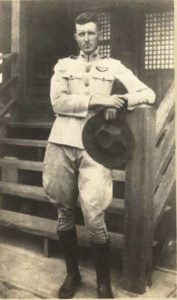Bonnie Latino reminded me that August 12 is the anniversary of the death of Lt. William Maxwell. In our text exchange, Bonnie asked me if I knew as I was growing up here that Maxwell AFB was named for him. She didn’t know it until 1998. I didn’t know it growing up either. Isn’t that a shame?
August 12 marks the 100-year anniversary of Lt. Maxwell’s death – a hero’s death.
In the November 2015 “atmore” magazine, Bonnie and her writing colleague Bob Vale put together an article, “What Makes a Hero?” about Lt. Maxwell (November 9, 1892 – August 12, 1920).
Following are excerpts from their article. We appreciate their willingness to share. And we appreciate Bonnie’s reminder – lest we forget.

By BONNIE LATINO and
BOB VALE
“Atmore’s sons and daughters have answered our country’s need of manpower for the conflicts we have historically faced. Most returned, some were decorated, some injured, some both. Others, perished in distant lands.
“One of Atmore’s sons, Lt. William C. Maxwell, was posthumously honored by having a military base named after him, making him one of this area’s most visible veterans. Maxwell Air Force Base (AFB) in Montgomery, Alabama, assures that distinction will continue to grow through coming years. This is perhaps the ultimate way to recognize the service and sacrifice of Lt. Maxwell and, through his story, all our veterans: Past, present; near and far.
“Lt. Maxwell, who died on August 12, 1920, didn’t live to marry his beloved Texas fiancée. No children bore his name. Fortunately, because Maxwell AFB honors the service and life of Lt. Maxwell, his family name endures. The finest of America’s Air Force officers train at various times in their careers at Maxwell AFB via the base’s prestigious Command and Staff and Air War College. Thus, the lieutenant’s family name is known worldwide.
“During World War I, Lt. Maxwell was assigned to the 3rd Aero Squadron of the United States Army Air Corps. While piloting his DH4 (De Havilland Patrol Bomber) during a combination training mission / mail run from his base to Manila in the Philippines, he experienced engine trouble. Rather than landing his malfunctioning aircraft in a small clearing, where he saw children playing, he chose to land in an area that resulted in a crash which ended his life. His decision spared their lives at the cost of his own. That instinct springs from the service before self instinct.
“In a broader sense, this selfless character trait is in all warriors who have to make life and death choices at a moment’s notice. Is that what makes a hero? Is that what defines his or her actions under extreme pressure? Is that what defines an American? It certainly happens in other cultures.
“What drives such men and women, those whom we honor, sometimes posthumously, as heroes? Many would probably like to think we would make the same choice, but would we? Most of us will never know because we’re not likely to be faced with a choice of such finality.
“That is precisely why we elevate people like Lt. Maxwell to hero status. One suspects that the unassuming Willie Maxwell, as he was known to family and friends, would not perceive himself as a hero. However, that is why our country names military bases in honor of men like him.
“That Lt. Maxwell is remembered in the same way as are warriors like Lieutenant Samuel Reeves Keesler, Jr., Lt. Colonel Horace Meek Hickam, and other U. S. military heroes, preserves the memory of Lieutenant William Calvin Maxwell, a man who Atmore and Robinsonville are proud to claim as our own.
“A century after his death, it is ironic that Lt. Maxwell’s legacy transcends the very places that helped mold him into the man he ultimately became.”
